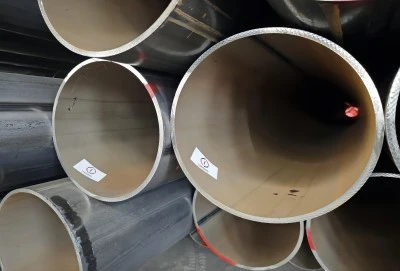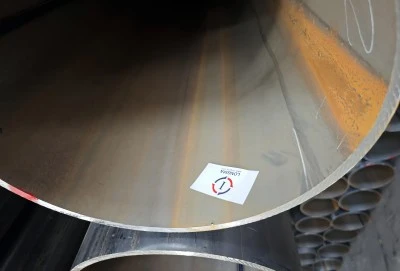API 5L ERW pipes are essential components in the oil and gas industry, known for their exceptional strength, durability, and reliability. These electric resistance welded (ERW) steel pipes meet stringent industry standards, making them ideal for various applications in demanding environments. Understanding the key features and certification requirements of API 5L ERW pipes is crucial for engineers, project managers, and contractors working on large-scale infrastructure projects worldwide.
|
|
|
Essential Characteristics of API 5L ERW Pipes
High-Strength Steel: Durability in Demanding ConditionsAPI 5L ERW steel pipes are manufactured using high-strength steel, ensuring exceptional durability in challenging operational environments. The steel composition is carefully selected to meet specific grade requirements, such as X52, X60, or X70, which indicate the minimum yield strength of the material. This high-strength characteristic allows the pipes to withstand extreme pressures and temperatures, making them suitable for transporting oil, gas, and other fluids over long distances.
The manufacturing process involves precise control of the steel's microstructure, resulting in a uniform grain structure that enhances the pipe's mechanical properties. This uniformity contributes to the pipe's ability to resist deformation and maintain its structural integrity under varying loads and environmental conditions.
Corrosion Resistance: Longevity in Harsh Environments
Corrosion resistance is a critical feature of API 5L ERW steel pipes, particularly in applications where exposure to corrosive substances is common. The pipes are often coated with specialized materials or undergo surface treatments to enhance their corrosion resistance. These protective measures significantly extend the service life of the pipes, reducing maintenance costs and minimizing the risk of leaks or failures.
Advanced coating technologies, such as fusion-bonded epoxy (FBE) or three-layer polyethylene (3LPE) systems, provide excellent protection against external corrosion. For internal corrosion protection, manufacturers may apply special linings or use corrosion-resistant alloys in the pipe construction.
Seamless Welding: Ensuring Structural Integrity
The electric resistance welding process used in API 5L ERW steel pipe production creates a strong, continuous seam along the pipe's length. This welding technique ensures excellent structural integrity and minimizes the risk of weld failures. The high-frequency welding process used in ERW pipe manufacturing results in a narrow heat-affected zone, preserving the material's mechanical properties near the weld.
Quality control measures, such as online ultrasonic testing and eddy current inspection, are implemented during production to verify the weld quality and detect any potential defects. These rigorous testing procedures guarantee that the welded seam meets or exceeds the strength requirements of the base metal, ensuring the pipe's overall reliability and performance.
API 5L Certification Process
Material Testing: Ensuring Quality and ComplianceThe API 5L certification process involves comprehensive material testing to verify the pipe's compliance with specified requirements. These tests evaluate various properties, including tensile strength, yield strength, and chemical composition. Manufacturers must conduct mechanical tests, such as flattening tests and bend tests, to assess the pipe's ductility and formability.
Non-destructive testing (NDT) methods, including ultrasonic testing and radiographic inspection, are employed to detect internal defects or irregularities in the pipe wall. Hydrostatic pressure tests are also performed to confirm the pipe's ability to withstand specified operating pressures without leakage or failure.
Documentation Requirements: Traceability and Transparency
Accurate and detailed documentation is a crucial aspect of the API 5L certification process. Manufacturers must maintain comprehensive records of material sourcing, production processes, and quality control measures. This documentation ensures full traceability of each pipe from raw material to finished product.
Key documents include material test reports (MTRs), which provide detailed information on the chemical composition and mechanical properties of the steel used. Production records, heat treatment logs, and inspection reports are also required to demonstrate compliance with API 5L specifications.
Third-Party Inspections: Validating Manufacturing Standards
Independent third-party inspections play a vital role in the API 5L certification process. These inspections validate the manufacturer's quality control systems and verify compliance with API standards. Accredited inspection agencies conduct on-site audits, witness critical tests, and review documentation to ensure that all requirements are met.
The involvement of third-party inspectors adds an extra layer of assurance for end-users, providing confidence in the quality and reliability of the API 5L ERW pipes. These inspections also help maintain consistency across different manufacturers and production facilities, ensuring a uniform standard of quality in the global market.
Industry Applications for API 5L ERW Pipes
Oil and Gas: Efficient Transportation SolutionsAPI 5L ERW steel pipes are widely used in the oil and gas industry for the transportation of crude oil, natural gas, and refined products. Their high strength-to-weight ratio and excellent pressure resistance make them ideal for long-distance pipelines, gathering systems, and distribution networks. The pipes' ability to withstand high internal pressures and external loads ensures safe and efficient fluid transport across varied terrains and environmental conditions.
In offshore applications, API 5L ERW pipes are utilized for subsea pipelines and risers, where they must withstand extreme hydrostatic pressures and dynamic loads. The pipes' corrosion resistance is particularly valuable in marine environments, where exposure to saltwater and harsh chemicals is common.
Water Infrastructure: Reliable Supply and Drainage Systems
The durability and corrosion resistance of API 5L ERW steel pipes make them suitable for water infrastructure projects. They are used in municipal water supply systems, irrigation networks, and industrial water treatment facilities. The pipes' smooth internal surface minimizes friction losses, enhancing flow efficiency and reducing pumping costs.
In large-scale water management projects, such as desalination plants or inter-basin water transfer systems, API 5L ERW pipes provide a cost-effective and reliable solution for transporting large volumes of water over long distances. Their ability to withstand high pressures allows for efficient water distribution in urban areas with varying elevations.
Construction: Structural Support in Building Projects
API 5L ERW steel pipes find applications in the construction industry as structural elements in buildings and infrastructure projects. Their high strength-to-weight ratio makes them ideal for use in columns, beams, and support structures in high-rise buildings and industrial facilities. The pipes' uniform wall thickness and consistent mechanical properties contribute to their reliability in load-bearing applications.
In bridge construction, API 5L ERW pipes are used for piling and foundation support, offering excellent resistance to compressive and lateral loads. Their corrosion resistance is particularly valuable in marine and coastal environments, where exposure to saltwater and atmospheric corrosion is a concern.
API 5L ERW steel pipes are indispensable components in various industries, offering a combination of strength, durability, and reliability. Their key features, including high-strength steel, corrosion resistance, and seamless welding, make them suitable for demanding applications in oil and gas, water infrastructure, and construction projects. The rigorous certification process ensures consistent quality and compliance with industry standards, providing confidence to engineers and project managers worldwide. As global infrastructure development continues to grow, the importance of API 5L ERW pipes in ensuring safe, efficient, and long-lasting fluid transportation and structural support systems cannot be overstated.
API 5L ERW Pipes Manufacturer
When seeking high-quality API 5L ERW steel pipes for your project, consider Hebei Longma Group, a leading manufacturer with advanced production capabilities. Our state-of-the-art equipment, imported from Germany and complemented by four independently developed production lines, ensures top-notch quality and consistency. With a professional team of over 300 employees, including more than 60 technical experts and an independent research team, we deliver innovative solutions tailored to your needs. Our comprehensive testing facilities, featuring online ultrasonic automatic flaw detectors and industrial X-ray television, guarantee the highest standards of quality control. We pride ourselves on fast delivery, with the ability to complete standard thickness steel pipe production in as little as 7 days. Hebei Longma Group holds all necessary certifications, including API 5L, ISO 9001, ISO 14001, and FPC certificates, ensuring compliance with international standards. Our competitive pricing is made possible through long-term partnerships with raw material suppliers and an integrated production model that optimizes costs without compromising quality. For more information on our API 5L ERW pipes and other steel pipe products, contact us at info@longma-group.com.














